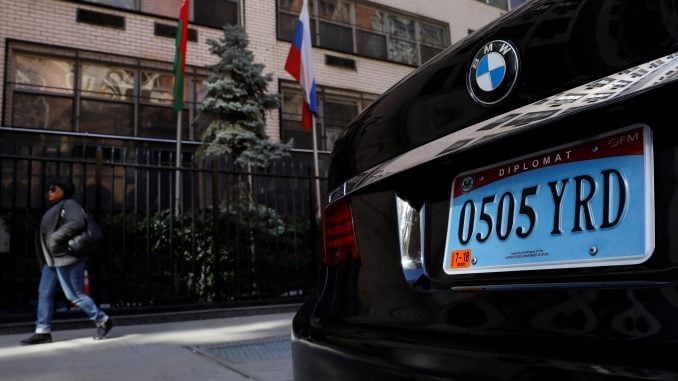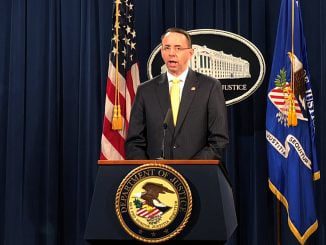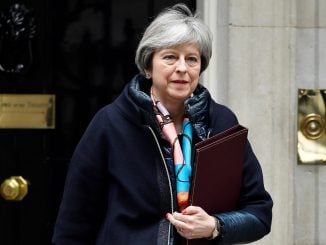
LONDON/WASHINGTON, D.C. – President Donald Trump said on Monday that the United States would expel 60 Russian diplomats, joining governments across Europe in punishing the Kremlin for a nerve agent attack on a former Russian spy in Britain that they have blamed on Moscow.
British Prime Minister Theresa May, welcoming the show of solidarity, said 18 countries had announced plans to expel Russian officials. Those included 14 European Union countries, as well as Ukraine, Canada and Albania. In total, Monday’s announcements affected more than 100 Russian diplomats – the biggest Western expulsion of Russian diplomats since the height of the Cold War.
British Foreign Secretary Boris Johnson tweeted that Monday’s “extraordinary international response by our allies stands in history as the largest collective expulsion of Russian intelligence officers ever and will help defend our shared security.”
May said the coordinated measures “clearly demonstrate that we all stand shoulder to shoulder in sending the strongest signal to Russia that it cannot continue to flout international law.”
Russia’s Foreign Ministry called the actions a “provocative gesture.” The Kremlin spokesman said the West’s response was a “mistake” and that Russian President Vladimir Putin would make a final decision about Russia’s response.
Moscow has denied being behind the attack on Sergei Skripal and his daughter in the southern English city of Salisbury on March 4. Skripal, 66, and his 33-year-old daughter Yulia were found unconscious on a public bench in a shopping center, and remain critically ill in hospital.
Monday’s wave of expulsions came after EU leaders said last week that evidence presented by May of Russian involvement in the attack was a solid basis for further action.
The staff expelled by the United States included 12 intelligence officers from Russia’s mission to the United Nations headquarters in New York, a senior administration official told reporters. Trump also ordered the closure of the Russian consulate in Seattle.
“To the Russian government we say: when you attack our friends, you will face serious consequences,” one of the U.S. officials briefing reporters said, speaking on condition of anonymity.
The individuals concerned and their families have been given a week to leave the United States, according to the official.
Trump, who before he took office in January last year promised warmer ties with Putin, last week congratulated the Russian leader on his re-election, drawing criticism from Republicans and Democrats alike. Trump said the two leaders had made tentative plans to meet in the “not too distant future.”
U.S. lawmakers largely welcomed Trump’s move on Monday.
The closure of the Russian consulate in Seattle was due to its proximity to a U.S. submarine base and planemaker and defense contractor Boeing, a senior administration official said. Seattle was a hub of Russian cyber espionage, both political and commercial, according to two U.S. intelligence officials.
The UN mission in New York was also a major center for Russian financial spying and recruiting, the officials said. The New York operations included money laundering and other financial crimes in addition to espionage on U.S. and UN targets, they said.
All the Russians picked for expulsion from the United States have been identified as intelligence officers, according to U.S. officials familiar with the expulsions.
“The last time that the United States expelled so many Russian spies was when the Reagan administration ordered 55 Soviet diplomats out of the country in 1986,” said Angela Stent, director of the Center for Eurasian, Russian and East European Studies at Georgetown University.
“This U.S. solidarity with Britain and other European allies after the Skripal poisoning is unprecedented in the post-Soviet era and highlights the continuing downward spiral of Russia’s relations with the West,” she said.
The U.S. officials said the scale of the expulsions was based not only on the expansion of Russian espionage in the United States, but also on its increasing focus on critical infrastructure targets such as electrical grids, financial networks, transportation and healthcare.
Skripal’s poisoning, alleged to have employed the Soviet-era military-grade nerve agent Novichok, is the first known offensive use of a nerve toxin in Europe since World War Two.
RUSSIA PROMISES ‘SYMMETRICAL’ RESPONSE
European Council President Donald Tusk said further measures could be taken in the coming weeks and months. Mexico said it reserved the right to expel diplomats.
Russia said it would respond in kind.
“The response will be symmetrical. We will work on it in the coming days and will respond to every country in turn,” the RIA news agency cited an unnamed Foreign Ministry source as saying.
The Russian embassy in the United States asked Twitter followers to vote what U.S. consulates they would close in Russia, if they could decide. Besides the embassy in Moscow, the United States has three consulate generals in Russia.
The Kremlin has accused Britain of whipping up an anti-Russia campaign and has sought to cast doubt on the British analysis that Moscow was responsible. Russia has already ordered 23 British diplomats out of the country after Britain expelled 23 Russian diplomats.
Russian Foreign Ministry spokeswoman Maria Zakharova suggested in a post on Facebook that the EU’s expression of support for Britain was misguided given that it would be leaving the bloc next year. A British court has said Skripal and his daughter may have suffered brain damage, while a policeman who went to help them has also indicated that he has suffered lasting damage to his health.
British Defense Secretary Gavin Williamson hailed the support for Britain during a visit on Monday to Estonia. Britain has troops there as part of a NATO mission to deter any Russian aggression following its seizure of Ukraine’s Crimea in 2014.



